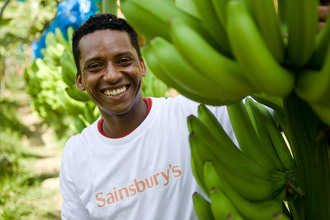-
Make housing developers be transparent in NottinghamCurrent planning law states that if a developer will make less than 20% profit on a new development, they can ignore a council's regulations about building affordable and social housing. Leaked documents from several developers have shown that the maths they use to work out their profit margins are purposefully misleading, allowing them to claim they will make less than 20% profit on a development by undervaluing the prices of the houses they will sell and over-costing the labour. To combat this Islington, Greenwich, Lambeth and Bristol councils have introduced a policy that forces developers "viability assessments" to be made public. By bringing their faulty maths into the public domain, Councils, campaigning groups and individuals will be enabled to hold developers to account and force them to use more honest maths.639 of 800 SignaturesCreated by Anthony Wilson-greatorex
-
Stop Ocado's self driving vehicles in LondonIt is important for one simple reason: It puts people out of jobs. Let's start with stopping Ocado's trials for self-driving vehicles in London, and then move on to stopping drones, self service points in supermarkets, and anywhere else that threatens hard working people' jobs and only serves to make the rich richer and the poor poorer.8 of 100 SignaturesCreated by Rupert Copping
-
Make housing developers be transparent in LiverpoolCurrent planning law states that if a developer will make less than 20% profit on a new development, they can ignore a council's regulations about building affordable and social housing. Leaked documents from several developers have shown that the maths they use to work out their profit margins is either hidden from the public or purposefully misleading, allowing them to claim they will make less than 20% profit on a development by undervaluing the prices of the houses they will sell and over-costing the labour. To combat this Islington, Greenwich, Lambeth and Bristol councils have introduced a policy that forces developers "viability assessments" to be made public. This kind of policy should also be introduced in Liverpool. By bringing these dodgy maths into the public domain, Councils, campaigning groups and individuals will be able to hold developers to account and force them to use more honest maths. There are a number of internationally recognised projects working in Liverpool towards the development of new housing models, but the battle for affordable, high quality housing inevitably needs to be fought on many fronts. Changing the legislation to ensure all developers meet their responsibilities to the communities in which they are building will have tangible benefits to the people in the city.1,643 of 2,000 SignaturesCreated by Tim Jeeves
-
Tell Sainsbury's Not To Abandon FairtradeSainsbury's have started a trial of its own 'Fairly Traded' label to replace their support of the Fairtrade certification scheme. The Fairtrade Foundation is an internationally renowned and respected certification scheme, which empowers and supports farmers around the globe by ensuring they are paid a minimum price for their produce, as well as a financial bonus which is reinvested in their local communities in the form of education, pensions, and sick pay. Fairtrade ensures that the entire supply chain of companies is independently audited, and their work directly helps those living below the global poverty line. Whilst not perfect, they are the gold standard in ethical trading. Sainsbury's is the latest in a line of companies who are choosing to abandon their support of Fairtrade in favour of their own schemes. Where Sainsbury's differs from some other companies though, is that they had been such a large champion of Fairtrade, that their potential withdrawal from it could start a ripple effect which could lead to the beginning of the end of the scheme. Whilst Sainsbury's' own scheme will guarantee a minimum price for producers, the financial bonus will no longer go straight to the farmers that deserve it, but instead will have to be approved by a Sainsbury's foundation. This directly disempowers farmers who work hard to produce the items we take for granted in our weekly shops, such as tea, coffee, sugar, and bananas. Farmers will no longer be guaranteed this bonus, which can run into thousands of pounds and make a critical difference in poorer parts of the world. Michael Gidney, CEO of the Fairtrade Foundation says that the Sainsbury's scheme does not meet Fairtrade’s core principles, particularly in the area of “producer empowerment”. Many people believe that Sainsbury's are introducing this scheme as a cost-cutting measure to improve their own bottom line. Urge them to rethink their policy and not to abandon their support of Fairtrade. For more info, read here: https://www.theguardian.com/global-development/2017/jun/24/fairtrade-crashing-down-sainsburys-tesco-tea-growers-nairobi http://www.fairtrade.org.uk/Media-Centre/News/May-2017/Open-letter-to-Sainsburys-from-Fairtrade-producers https://www.thegrocer.co.uk/buying-and-supplying/sourcing/ngos-attack-sainsburys-over-fairtrade-row/553567.article5,169 of 6,000 SignaturesCreated by Taheerah Atchia

-
Stop Sainsbury's and Tesco dropping the Fairtrade label!Sainsburys and Tesco have both just announced plans to drop the Fairtrade label. Farmers and producers the world over will be hugely adversely affected by this move. It will be a step backward for this global world we live in. The supermarkets are planning to launch their own version of Fairtrade. However this will not be externally regulated by a third party and the strong likelihood is that this will be much less advantageous to the producers. This decision is callous, and entirely financially motivated on the supermarkets part. They have given the producers virtually no notice. They have not told customers about this plan because no doubt they know people will be outraged. We have the power to stop this by showing Sainsburys and Tesco that their customers will boycott them if they do this and it will have huge negative consequences for their brands. https://www.theguardian.com/global-development/2017/jun/24/fairtrade-crashing-down-sainsburys-tesco-tea-growers-nairobi314 of 400 SignaturesCreated by Elanor Caunt
-
Housing is a Human Right.Manchester Activist Network agree and campaign in line with the same principles as Housing First, who stand by the following philosophy: - Housing as a basic human right - Respect, warmth and compassion for all clients - No requirement regarding housing readiness - Consumer choice and self-determination - A recovery orientation - Harm reduction rather than abstinence with regards to substance misuse. Receiving an intensive case management team This approach is guided by the belief that people need basic necessities like food and a place to live before attending to do anything less critical, such as getting a job, budgeting properly or attending to substance use issues. The Housing First approach views housing as the foundation for life improvement and enables to permanent housing without prerequisites or conditions beyond those of a typical renter. The traditional supported accommodation, addressing addiction issues and subsequent move-on to long-term accommodation had failed repeatedly. (Laura's Story) http://icmblog.shelter.org.uk/a-housing-first-future/ Housing First, widely replicated in the US, Canada, Europe, has been actively growing interest in developing better housing responses for people with multiple and complex needs. - provides strong and consistent outcomes for tenancy sustainment of between 70% to 90% - Potential annual savings ranged between £4,794 and £3,048 per person in support costs - One study found an average cost savings on emergency services of $31,545 per person housed in a Housing First program over the course of two years. However, the future of the initiative is struggling due to: - Very little funding comes from other sectors including social services (4%) criminal justice (2%) and substance misuse (2%) - By far the biggest barrier to setting up a Housing First project was reported as access to suitable and affordable accommodation in both the social and private rented sectors. Inspiring Change Manchester ‘now know more than ever of the importance of a tailored support offer; which is the crucial element in supporting men and women who have led complex lives into stable accommodation. Not just ceasing at the point where a tenancy is signed, but continued and wrap-around support has brought the immeasurable benefit of people developing real relationships with peers who in turn link them into what is happening in their locality’ . Wayne's Story: http://icmblog.shelter.org.uk/wayne-talks-housing-first/ “I believe that when you build a life it’s like building a building. You start with the foundations; you don’t start with the roof. I was being offered jobs and training courses, but no housing.” - Wayne, Housing First resident. As one of the largest landowners in the country, Network Rail, has a portfolio that is shifting the landscape towards gentrification of our inner Cities. M.A.N. believe Network Rail have a corporate responsibility to minimise the negative social ramifications of this change, such as the rise in homelessness in Manchester. Manchester Activist Network181 of 200 SignaturesCreated by Nik Napier
-
All supermarkets stop selling the Daily Mail and Sun for one month!After all the lies about Labour (and the related racist articles) printed before the last election by the Daily Mail and the Sun, we are asking your supermarkets to stop selling these papers for at least one month. The Independent Press Standards Organisation is absolutely useless as a regulatory body, because at best after an enquiry, all newspapers have to do is print a tiny apology months later after the incident.635 of 800 SignaturesCreated by David Roper
-
Get the snap map bannedIt is unsafe and makes people vulnerable. It's an invasion of privacy, not only can your friends see where you are but also the creators of the app and G*d knows who else!42 of 100 SignaturesCreated by Tara Linkowska
-
Protect Lodgers Deposits across the countryThere is a major problem in the housing and property market whereby landlords whom want to make extra money renting individual rooms are providing no agreements and are taking sizable deposits from lodgers offering no protection as there is no policy or law that says they should do, 1.7 million homeowners rented rooms to lodgers in 2016 according to Santander Mortgages Survey. This matters because alot of professionals including our emergency services sector are renting in this way and by not regulating this area means hundreds of thousands of pounds are not returned with no consequences. I have a family member that decided to use a lodging platform for listings to find a room in London, she paid £1200 as a deposit, whilst living in the property the landlord began to infringe on her personal space and belongings and so she decided to give notice to leave, when she asked for the return of her deposit the landlord refused saying she missed payments and the room wasn't in the same condition he rented it to her in, she was devastated as there seemed to be nothing she could do but taking it to a claims court, she decided to walk away. I have heard thousands of stories just like this I want a Lodger Deposit Guard to be backed by the Department of communities and local government and rolled out as a mandatory action when renting a room going hand in hand with background checking to stop unregulated renting.196 of 200 SignaturesCreated by Jerome Davis
-
Air conditioning for bussesCuatomer and employee comfort and care. Being a customer i have a two hour commute on the busses and on extremely hot days its just unbrearble and i can only wonder how the drivers stay so composed under such strenuos working conditions dealing not only with the heat. But with ubcomfortable perspiering passengers who belive that it is the drivers fault that it is scorchingly hot both outside and on the busses.1 of 100 SignaturesCreated by Adam Stenning
-
Help prevent conversion of The Bengal Bear restaurant into flatsWe are a local village restaurant striving to attract customers to experience our freshly prepared food. As we provide soft drinks, customers use local shops for beverages. As a result this has increased village trade! Our vegetables and poultry are sourced by local suppliers to benefit local businesses. Our objective is to support our community, as we contribute towards our village events. We also enjoy accommodating our friends from the local care homes on their days out.799 of 800 SignaturesCreated by Afzal Uddin
-
Remove plastics from PG Tips tea bagsUnilever owns PG Tips, the UK's most popular cup of tea. Let's call on them to remove ALL plastics from tea bags - it is usually polypropylene. Teabags won't completely biodegrade if they have plastic in them. People in Britain drink 165m cups of tea EVERY day - with 96% of those from tea bags. That adds up to billions of pieces of plastic. As a market leader and the recent purchaser of Pukkha teas which doesn't use plastic in its tea bags, Unilever could help make a positive difference to the environment by removing plastic now. Polypropylene is a plastic and 20% is not a small or insignificant amount when multiplied up by the millions and millions of tea bags used daily around the world. All of these plastics remains un-degraded in the environment. There have been many campaigns to keep plastics and microplastics out of our seas, highlighting the harm they do to marine life. But the same is true of plastics on land as they can cause harm to birds and small mammals. We need to keep ALL plastics OUT of our environment. I believe that it is possible to use another material that is biodegradable - plant or fabric based. In fact, I understand that there is already one brand of conventional teabag which is polypropylene-free made by Jacksons of Piccadilly, so it is technically and practically possible. Let's make our environment plastic free and fully compostable with a change to the materials used in our tea bags.235,192 of 300,000 SignaturesCreated by Michael Armitage
Hello! We use cookies to improve your experience by providing insights into how the site is being used. Find out more.












